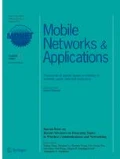Abstract
Clusters of mobile (LEO) satellites, flying at a non-geostationary orbit, have been recently proposed, designed and made operational for achieving a global coverage of roaming users. An example of these is Teledesic. The satellites of these clusters are equipped with a radio frequency switch and connected via intersatellite links to form a specific topology. Uncoordinated packet transmission in these systems may result in collisions. Collided packets must be retransmitted, with an obvious degradation in performance, in terms of both bandwidth usage and delay. This performance degradation can be overcome by a proper scheduling of the packets. In this paper, we consider optimal (namely minimum length) packet scheduling in LEO satellite clusters. We present a preprocessing algorithm which, together with the optimal, polynomial time, packet scheduling algorithm for isolated satellites, produces an optimal schedule in tree-connected clusters. The overall algorithm inherit the time complexity of the optimal one for isolated systems, and is O(N 4) for a cluster serving N roaming users.
Similar content being viewed by others
References
P. Agrawal, J.C. Chen and K. Sivalingam, Energy efficient network protocols for wireless networks, in: Wireless Multimedia Network Technologies for the New Millennium (Kluwer Academic Press, 1999) chapter 11.
M. Andrews, S. Khanna and K. Kumaran, Integrated scheduling of unicast and multicast traffic in an input-queued switch, in: INFOCOM'99 (March 1999).
P. Barcaccia and M.A. Bonuccelli, A polynomial time optimal algorithm for time slot assignment in variable bandwidth systems, ACM/IEEE Transactions on Networking 2(3) (1994) 247–251.
P. Barcaccia, M.A. Bonuccelli and M. Di Ianni, Minimum length scheduling of precedence constrained messages in distributed systems, in: EuroPar'96 Conference, Lyon, France, August 1996, Lecture Notes in Computer Science, Vol. 1024 (Springer, Berlin, 1996) pp. 594–601.
P. Barcaccia, M.A. Bonuccelli and M. Di Ianni, Complexity of minimum length scheduling for precedence constrained messages in distributed systems, IEEE Transactions on Parallel and Distributed Systems, to appear.
A.A. Bertossi, G. Bongiovanni and M.A. Bonuccelli, Time slot assignment in SS/TDMA systems with intersatellite links, IEEE Transactions on Communications 35 (1987) 602–608.
G. Bongiovanni, D. Coppersmith and C.K. Wong, An optimal time slot assignment for a SS/TDMA system with variable number of transponders, IEEE Transactions on Communications 29 (1981) 721–726.
M.A. Bonuccelli, A fast time slot assignment algorithm for TDM hierarchical switching system, IEEE Transactions on Communications 37 (1989) 870–874.
M.A. Bonuccelli, I.S. Gopal and C.K. Wong, Incremental time slots assignment in SS/TDMA satellite systems, IEEE Transactions on Communications 37 (1989) 870–874.
M.S. Borella and B. Mukherjee, Efficient scheduling of nonuniform packet traffic in a WDM/TDM local ligthwave network with arbitrary transceiver tuning latencies, IEEE Journal on Selected Areas in Communications 14 (1996) 923–934.
R.E. Burkard, Time-slot assignment for TDMA systems, Computing 35 (1985) 99–112.
C.-S. Chang, W.-J. Chen and H.-Y. Huang, Birkhoff—von Neumann input buffered crossbar switches, in: INFOCOM 2000, Tel Aviv, Israel, March 26–30 (2000).
H. Choi, H.A. Choi and M. Azizoglu, Efficient scheduling of transmissions in optical broadcast networks, IEEE/ACM Transactions on Networking 4 (1996) 913–920.
A. Ganz and Y. Gao, A time-wavelength assignment algorithm for a WDM star network, in: Proc. IEEE INFOCOM'92 (1992) pp. 2144–2150.
A. Ganz and Y. Gao, SS/TDMA scheduling for satellite clusters, IEEE Transactions on Communications 40 (1992) 597–603.
B. Gavish, LEO/MEO systems — global mobile communication systems, Telecommunication Systems 8 (1997) 99–141.
I.S. Gopal, M.A. Bonuccelli and C.K. Wong, Scheduling in multibeam-satellites with interfering zones, IEEE Transactions on Communications 31 (1983) 941–951.
M.W. Goudreau, S.G. Kolliopoulos and S.B. Rao, Scheduling algorithms for input-queued switches: Randomized techniques and experimental evaluation, in: INFOCOM 2000, Tel Aviv, Israel, March 26–30 (2000).
P.J.M. Havinga and G.J.M. Smit, Energy-efficient wireless networking for multimedia applications, Wireless Communications and Mobile Computing, to appear.
T. Inukai, SS/TDMA networking via ISL, in: Proc. ICC'81 (1981) pp. 70.6.1–70.6.5.
R. Jain, K. Somalwar, J. Werth and J.C. Browne, Heuristics for the scheduling I/O operations, IEEE Transactions on Parallel and Distributed Systems 8(3) (1997) 310–320.
F. Jia, B. Mukherjee and J. Iness, Scheduling variable-length messages in single-hop multichannel local lightwave networks, IEEE/ACM Transactions on Networking 3 (1995) 477–489.
A. Mekkittikul and N. McKeown, A practical scheduling algorithm to achieve 100% throughput in input-queued switches, in: INFOCOM 1998, San Francisco, CA (March 1998).
B. Miller, Satellites free the mobile phone, IEEE Spectrum (March 1998) 26–35.
G.R. Pieris and G.H. Sasaki, Scheduling transmissions in WDM broadcast-and-select networks, IEEE/ACM Transactions on Networking 2 (1994) 105–110.
C. Rose, Rapid optimal scheduling for time-multiplex switches using cellular automaton, IEEE Transactions on Communications 37 (1989) 500–509.
G.N. Rouskas and V. Sivaraman, On the design of optimal TDM-schedules for broadcast WDM networks with arbitrary transceiver tuning latencies, in: Proc. IEEE INFOCOM'96 (1996) pp. 1217–1224.
D.N. Serpanos and P.I. Antoniadis, FIRM: a Class of distributed scheduling algorithms for high-speed ATM swithces with multiple Input queues, in: INFOCOM 2000, Tel Aviv, Israel, March 26–30 (2000).
H. Uzunalioglu, W. Yen and I.A. Akyldiz, A connection handover protocol for LEO satellite ATM networks, in: Proc. ACM MOBICOM'97 (1997) 204–214.
Author information
Authors and Affiliations
Corresponding author
Rights and permissions
About this article
Cite this article
Bonuccelli, M.A., Martelli, F. & Pelagatti, S. Optimal Packet Scheduling in Tree-Structured LEO Satellite Clusters. Mobile Networks and Applications 9, 289–295 (2004). https://doi.org/10.1023/B:MONE.0000031588.69327.34
Issue Date:
DOI: https://doi.org/10.1023/B:MONE.0000031588.69327.34




